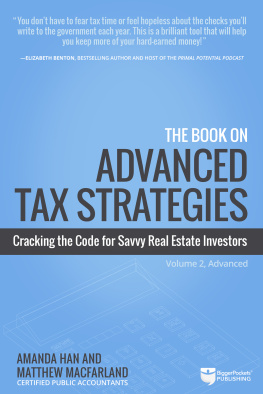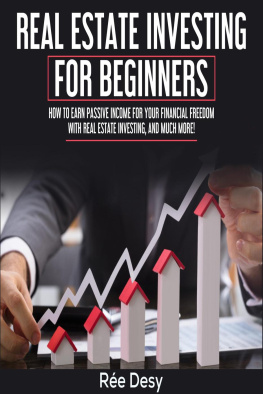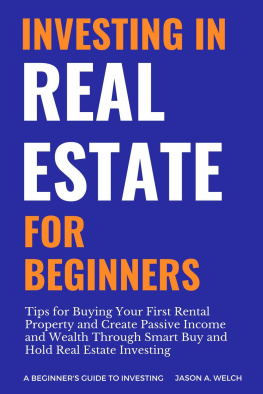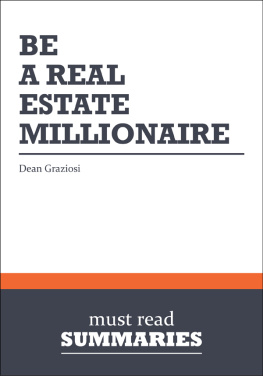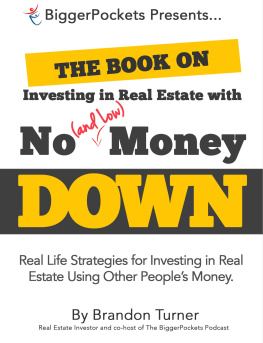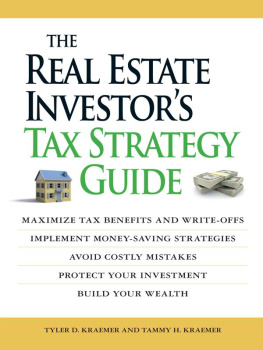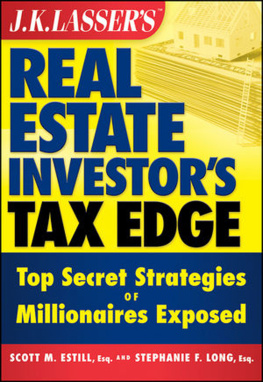Table of Contents
Page List
Guide
The Book on Advanced Tax Strategies
Digital Rights Disclaimer
All rights reserved. No portion of this book may be reproduced, distributed, stored in a retrieval system, or transmitted in any form or by any means, (including, without limitation, by electronic, mechanical, photocopy, recording, scanning, or other electronic of mechanical methods) except for brief quotations in critical reviews or articles, without the prior written permission of the publisher. This ebook is licensed and not sold.
If you are reading this and did not purchase on .
THE BOOK ON ADVANCED TAX STRATEGIES
THE BOOK ON ADVANCED TAX STRATEGIES
Cracking the Code for Savvy Real Estate Investors
VOLUME 2
AMANDA HAN AND MATTHEW MACFARLAND

This publication is protected under the U.S. Copyright Act of 1976 and all other applicable international, federal, state, and local laws, and all rights are reserved, including resale rights: You are not allowed to reproduce, transmit, or sell this book in part or in full without the written permission of the publisher.
Limit of Liability: Although the author and publisher have made reasonable efforts to ensure that the contents of this book were correct at press time, the author and publisher do not make, and hereby disclaim, any representations and warranties regarding the content of the book, whether express or implied, including implied warranties of merchantability or fitness for a particular purpose. You use the contents in this book at your own risk. Author and publisher hereby disclaim any liability to any other party for any loss, damage, or cost arising from or related to the accuracy or completeness of the contents of the book, including any errors or omissions in this book, regardless of the cause. Neither the author nor the publisher shall be held liable or responsible to any person or entity with respect to any loss or incidental, indirect, or consequential damages caused, or alleged to have been caused, directly or indirectly, by the contents contained herein. The contents of this book are informational in nature and are not legal or tax advice, and the authors and publishers are not engaged in the provision of legal, tax, or any other advice. You should seek your own advice from professional advisors, including lawyers and accountants, regarding the legal, tax, and financial implications of any real estate transaction you contemplate.
The Book on Advanced Tax Strategies: Cracking the Code for Savvy Real Estate Investors, Volume 2
Amanda Han and Matthew MacFarland
Published by BiggerPockets Publishing LLC, Denver, CO
Copyright 2020 by Tax Strategies Institute, LLC
All Rights Reserved.
Publishers Cataloging-in-Publication data
Names: Han, Amanda, author. | MacFarland, Matthew, 1975- author.
Title: The book on advanced tax strategies: cracking the code for savvy real estate investors / by Amanda Han, CPA and Matthew MacFarland, CPA.
Description: Denver, Colorado: BiggerPockets Publishing, [2019] | Includes bibliographical references.
Identifiers: LCCN 2019034495 (print) | LCCN 2019034496 (ebook) | ISBN 9781947200227 (paperback) | ISBN 9781947200289 (ebook)
Subjects: LCSH: Income taxUnited States. | Real estate investment--United States. | Income tax deductionsUnited States. | TaxationUnited States. | Real estate investmentTaxationLaw and legislationUnited StatesPopular works.
Classification: LCC HJ4653.R4 .H36 2019 (print) | LCC HJ4653.R4 (ebook) | DDC
343.7305/246dc23
LC record available at https://lccn.loc.gov/2019034495
LC ebook record available at https://lccn.loc.gov/2019034496
Published in the United States of America
Printed on recycled paper
10 9 8 7 6 5 4 3 2 1
This book is dedicated to:
Our parents, without whom none of this would have been possible.
And to our kids, who we hope to raise with the belief that anything is possible.
TABLE OF CONTENTS

INTRODUCTION
CRACKING THE TAX CODE
Tax law is convoluted and getting more complicated every day. Try reading the Internal Revenue Code for ten minutes and you will feel like Alice in Wonderland chasing a rabbit down a rabbit hole. People often ask us why the tax law is so complicated.
The reason for the complexity of our tax code is that it was not designed simply to collect tax revenuethe truth is, our tax system was designed with many other goals in mind as well. Besides raising revenue, taxes are designed to both stimulate the economy and to influence social behavior. Tax benefits are provided to those who exhibit the intended behavior, while tax hurdles exist to discourage people from unwanted behavior. Investing in real estate is one of the behaviors that the government wants to encourage, so the tax code is filled with benefits and loopholes that incentivize us to use real estate to grow our wealth.
Contrary to popular belief, having a higher income doesnt have to mean paying more in taxes. You may have heard that Amazon, the worlds largest retailer, paid zero income taxes in a year when it earned $9.4 billion in net profits. This didnt happen by chanceit was achieved with careful planning and utilization of the many loopholes that the government intentionally created for taxpayers. Amazon operated their business to stimulate the economy in the way the government intended, and as a result, the company was able to pay zero taxes. In other words, there is nothing illegal about making $9.4 billion in profits and paying no taxes. If companies like Amazon can control how much tax they pay, how can we as real estate investors do the same?
This book is designed to help answer this exact question. Believe it or not, tax breaks are not just for the multi-billion-dollar companies and the millionaire investors. Tax breaks exist for people from all walks of life, all types of professions, and all income levels.
During speaking events, we meet many real estate investors with all types of backgroundsfrom newbie investors looking for their first deal to seasoned investors with dozens of properties. We meet active investors involved in wholesale or fix-and-flip projects, as well as investors putting together syndications of large multifamily or commercial deals, and we truly enjoy speaking with them about their investments, strategies, and goals.
Without fail, investors ask us questions they have about their own taxes. Its extremely surprising to us thateven though most Americans know that the tax code favors real estate investorsmost investors have no idea how to actually take advantage of these benefits. What can they deduct as real estate expenses? Why did their CPA say a home office is not available for real estate investors? Do they really need an LLC to take advantage of the real estate write-offs we shared from the stage?
When we wrote our first book, we intentionally chose topics that would be easy to explain. Our goal was to help investors build a solid foundation and understanding of some of the strategies that can be applied to everyday real estate investors. Of course, we could not end the story there. As real estate investors, it is important to take the next step toward more advanced tax-saving strategies. After all, why pay Uncle Sam more than required when the tax code is filled with loopholes for real estate investors?

